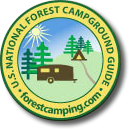Before you hit the road – stocking your camp kitchen
Before we got our recreational vehicle (RV), my kitchen was two large homemade wooden boxes with drop-down fronts, an ice chest, a two burner propane camp stove, and the end of a picnic table. The RV kitchen (galley) I work in today has most of the comforts of home (although much smaller scale) including a microwave and hot water heater but has challenges of its own. Remember, stocking your camp kitchen depends on cook’s skills and adventurous nature. Here are some lessons learned from those distant tent-camping days and a few from recent RV adventures.
First, think small in just about everything from pantry items to what you cook in.
Second, stackable containers are a camper’s best friends. Metal containers stack better than glass and are less likely to break. Rectangle shapes are best since they leave no wasted space when stored. Before investing in containers measure cabinets and plan your purchases accordingly. One storage option that is a personal favorite – plastic, resealable bags. Fill them with whatever, squeeze the air out, seal, and stack one on top of the other. Great space saver.
Next, when considering cookware remember what space you have available before making any purchases. Also avoid buying anything that might chip and dent easily. Nonstick cookware, if stacked, will need something between to protect the surface. Paper towels work well but I prefer thick felt pads cut to size. (The felt seems to cut down on rattle, too.)
Don’t forget, when planning and organizing your galley, think about the inside of cabinet doors. There is additional storage space there for things like spices, paper towels, and such.
When the upcoming road is extremely rough, stuff the kitchen cabinets with towels, pillows, etc. to help keep cabinet’s contents safe and unbroken. And always be careful when opening those doors. Things do shift around even on the smoothest of roadways.
Save your empty frozen juice cans (and their lids) for hot cooking oil and fat. The cans won’t deteriorate and can be stored, covered, safely until thrown away.
Remember when selecting a campsite, find as level a spot as possible. Things in a RV work better when on level ground. Also, consider how hard your refrigerator must work on those hot sunny summer days and try to get it in the shade. Another point to remember, don’t overpack that refrigerator. Limiting circulation will reduces your refrigerator’s efficiency. A separate ice chest for drinks and snacks, especially if camping with children, is a good idea and will free up refrigerator space.
Galley essentials I can’t go camping without:
- a small, hand-held electric mixer, as well as an assortment of favorite cooking tools such as a wooden spoon, pancake turner, ladle, knives, etc.;
- a large glass and small plastic mixing bowls;
- 1-quart and 2-quart saucepans, 10 inch skillet, all with lids;
- 9x9x2 inch baking dish and 8-inch pie pan, both glass*; and
- a cookie sheet or jelly roll pan.
Having a well-stocked, well-organized galley is essential for convenient cooking on the road. Hope the lessons I have learned will help you enjoy your camping cooking as much as I.
* Using glass rather than melt baking dishes means I won’t have to increase my oven’s temperature to compensate of elevation (see Cooking at ).


